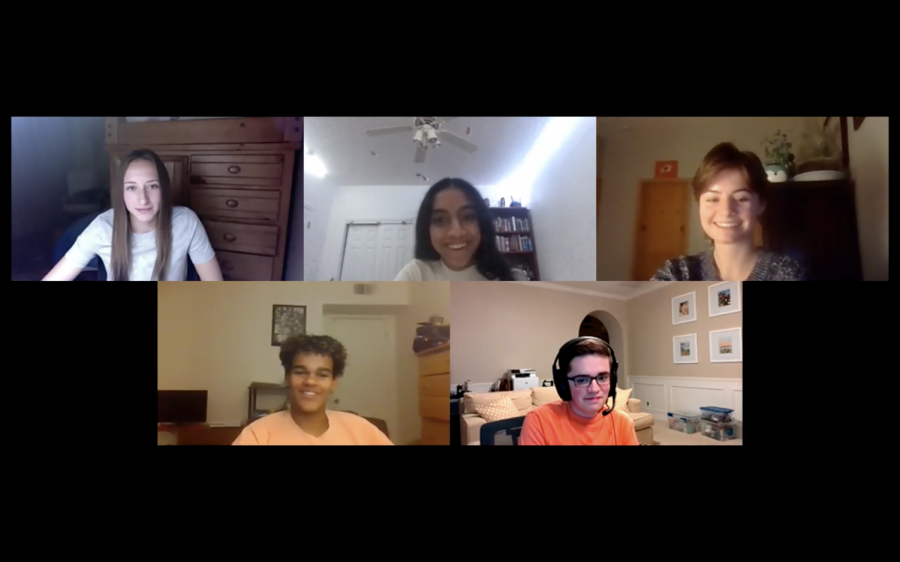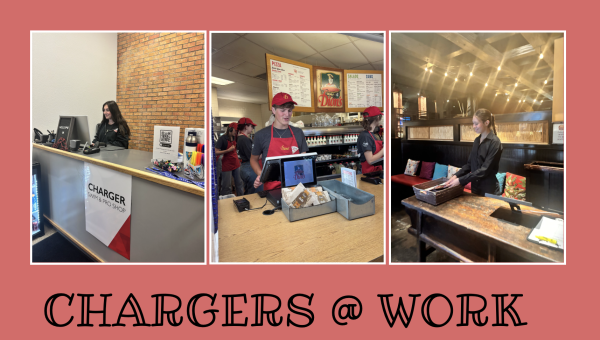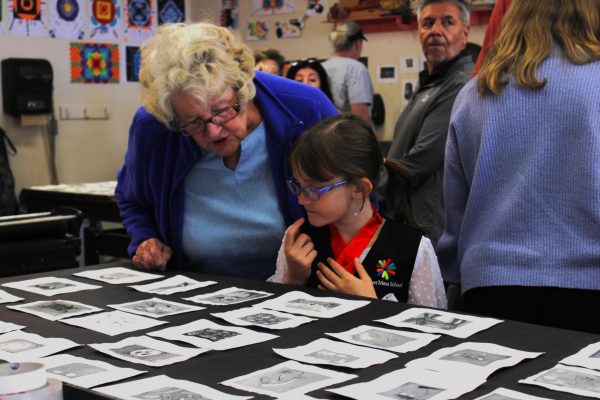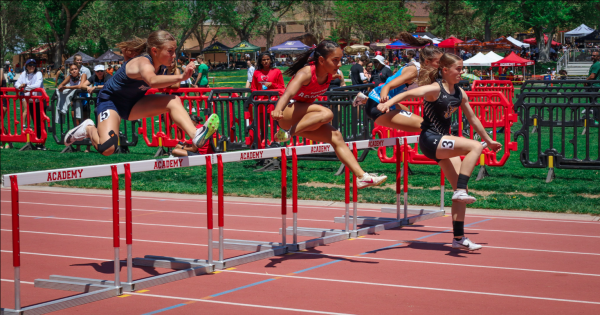How do AA students feel about Biden as President Elect?
From the top left: Lorelei Logan ’21, Siddhi Gardner ’21, Isabelle Gurney ’21, Max Chandler ’22, Carter Elias ’21
This year’s presidential election brought with it months of controversy and anticipation, unlike anything Gen Z has experienced. As teens and young adults have started getting invested in politics and activism during quarantine, we at The Advocate wondered, how do students at Academy feel about Biden winning the election? To find the answer, we interviewed four students in a round-table discussion about their personal beliefs and feelings on the election and politics in general.
All four students seemed to come to the consensus that neither candidate was ideal and that they all chose what they believed to be the lesser of two evils. Going into the election, Isabelle Gurney ‘21 and Max Chandler ‘22 both supported Biden, Lorelei Logan ‘21 supported Trump, and Carter Elias ‘21 did not support either, but instead kept his focus “more on local and senate elections.”
All four students did not like the racism, sexism, and allegations of sexual assault from Trump. Gurney believes that racist and sexist comments show “that you’re not the most mature person, or you’re not even trying to work on yourself when you can’t even see the things that are wrong, or you don’t care.” As for Elias, he specifically brought up Trump’s support of corporate bailouts during the pandemic which supports larger corporations, leaving small businesses to fail. Even though she supported Trump, Logan thought he was a less-than-ideal president. Like the other three students, she expressed dislike for Trump and his policies, stating that she is also against corporate bailouts, saying, “It goes against what true capitalism is,” but supported him because she wants to maintain a right-leaning government.
Obviously, Biden was not the ideal candidate either. While all four expressed concern for the age of both candidates, Logan was especially concerned about the fact that Kamala Harris is more left-leaning, and that something could happen to Biden, leaving us with “a more radical president than we anticipated.” Elias also points out that Biden has been coerced into appearing further left than he actually is, and that although he is a moderate Democrat, “his government might not be a moderate democrat government because of Harris and because of who he might be pressured into choosing for his cabinet.” Although they supported Biden in this election, Gurney and Chandler both expressed concern for some aspects of Biden’s presidency, and they felt he was simply the better of the two options.
When asked about the hostility between Trump and Biden supporters, all four more or less agreed on multiple contributing factors. Not only does the media portray both parties as extremes, not leaving much middle ground, but Gurney says, “It’s just very easy to attack people when there are so many differences when all you’re shown is the extreme.” Social media plays a huge role in the heightened political toxicity, especially as more and more teenagers are becoming invested in politics. Elias attributes most of the hostility to the internet, saying, “It’s easy to fall into echo chambers on the internet. In real life, you can’t change who you run into, and you’re gonna have to learn how to get along and find common ground with people because you’re there with them in real life,” pointing out how easy it is to be drawn into circles of people who share your same views on social media. Logan has personally experienced online hate because of her political beliefs, and says, “When you’re online, either you’re surrounded with your own beliefs, which is dangerous, or sometimes you’re being attacked by other opinions and I think in both cases it’s really easy to be defensive and think that it’s almost a war, and that you need to protect yourself at all costs.” Chandler says beneficial bipartisan discussion is “how change happens. That’s how we come to a consensus and move on… Right now it’s just clashing heads and nothing’s ever going to happen. It’s just going to be back and forth.” The takeaway from this conversation was “the vast majority of people who have a political opinion, have that opinion because they think it will lead our country in a better direction,” as Elias said. All four students kept this mindset as they started to discuss more controversial topics in a respectful and constructive way.
When the topic of abortion was brought up, the students that chimed in made it clear they were on differing sides, but both were respectful of each other. As someone who is pro-choice, Gurney worries about “the idea that a woman may have abortion access in one state and not in another… I would just say that [Biden] should do everything in his power to protect the basic right to bodily autonomy.” Following this, Elias said he does not agree with Gurney, because for him, “there has to be a point when it does stop being abortion… When does that fetus stop being part of the woman’s body and start being its own body.” Logan is pro-life, saying, “If it were just a matter of bodily autonomy of a woman, if it were just her right to choose what she does with her own body, I’m completely fine with that… The right to life is a fundamental right and I would classify a fetus, who is living and growing as a person deserving of the fundamental right of life.” Although Gurney does not think that life begins at conception, she believes that other things come into consideration, such as the mother’s ability to provide for a child or the health of the mother. She also points out that as the abortion conversation progresses on a larger scale, she wonders, “How are you seeing the mother? Are you seeing the mother as just a womb?… When it comes out that the motive is possibly to control women’s bodies.” Logan clarified her stance even further, saying, “I would never try to get something into legislation just to suppress women and women’s rights, and I do think that it is really complicated and some women are in terrible positions, but I just fundamentally don’t believe that any circumstance gives somebody the right to choose life or not for another person.” In the end, there was a sort of agreement to disagree, but it was brought up that Biden cannot do much on the topic of abortion, as Roe v Wade still stands.
The conversation then shifted to another controversial topic, police brutality. All four students agreed that police departments as a whole needs reform, but defunding the police was disputed in the group. Elias and Logan both said that the police need some reform and more regulation, but that defunding the police is not the solution. Logan pointed out that “right now there is a lot of hostility toward the police. And I think that might have some dangerous implications in the future,” and that this hostility toward the police would discourage members of our generation from joining the police force. While Gurney and Chandler did not outright agree with defunding the police, they both agree that funds for the police could be reallocated in order to give the public better access to things such as social services. Gurney believes the reallocation of police funds would “take some things off of the plate of the police so they can be handled by people who are trained for those specific scenarios.” Police reform would be handled on the state level, so as president, Biden could not control what each individual state does.
These four students engaged in a respectful discussion about the election and politics and were able to find common ground from different sides of the political spectrum. If this kind of political discussion is interesting to you, Elias runs the Political Science club, where they discuss these and many other topics. Feel free to reach out to him at [email protected].












Evelyn • Feb 3, 2021 at 9:28 am
I noticed in some comments (some made by younger students who are still impressionable) some comments that are not fully accurate and had a few things to note. In response to some comments above: I suggest you do your own research instead of believing what the media (usually biased one way or another) or your parents are telling you. There are multiple direct sources pointing to Trump’s sexism (and no, not supporting LGBTQ+ doesn’t make you sexist, just a terrible person). As to his sexism, I would like to point to the bus tapes from 2016 and various comments made about his own daughter. As for the comments addressing President Biden: both Trump and President Biden are around the same age and to say that President Biden is not fit due to his age, would mean that you agree that Trump is not fit due to his age either. As for President Biden’s speech, it has been made clear and present that he has had a speech impediment since a young age, and making the claim that because of his stutter he is unfit, borders on the line of being ableist. Yes, while Trump was in office, he did well for our country economically, but we need to move past “red vs. blue” and become a country united in order to *actually* make America great.
Julia Ross • Feb 17, 2021 at 1:59 pm
Thank you for this comment, Evelyn. It’s good to see the older students taking an interest in mentoring and educating the younger ones. With age comes wisdom, as they say.
Rhea • Jan 7, 2021 at 7:46 pm
I believe this was a difficult election for all of us, mostly concerning age, racism, and of course, the pandemic that has paved our path through 2020. I am relieved that people can still voice their controverting opinions in peace, and have an educated discussion.
Greta • Jan 4, 2021 at 8:32 am
I liked this article, and I admire how the students were able to conduct in a respectful conversation about controversial topics. I personally think that this election was not the best, and that neither of the two presidents were really the best choice for America right now. However, I do think that Biden was a better choice. I believe that we all need to keep fighting for LGBTQ+, BLM, and female rights. And I would rather support a president that will try to fight for these people, and address these problems rather than ignore them. This is what I personally believe, and I’m just putting my opinion out there.
Phoebe • Jan 3, 2021 at 10:37 pm
I personally think that Trump’s response to covid-19 was not the best. He might have nor wanted to scare us, but that doesn’t really work for a virus. We all need to wear masks, and quarantine and the Trump not wearing a mask isn’t a great model of what we should be doing. I also think you need to respect people and their opinions no matter what. People should support BLM and LGBTQ+, because your race gender or who you like should not define you. I personally am glad Biden is president and though he might be old I think he will be a great president.
Savanna Sedillo • Dec 21, 2020 at 5:19 pm
First, I would like to say that Trump is not sexist. I believe that just because someone doesn’t support the lgbtq+ community doesn’t mean they are sexist. Second, was he really that bad? People blame covid on Trump and I personally think it is RIDICULOUS. He isn’t some wizard that can cure every disease in the world. People also say Trump didn’t tell us about covid right when it came here. Well, did you ever think that he was trying not to scare us to death? I am pretty sure that the government uses the same procedure with UFOs and aliens. And perhaps he thought it would possibly die down and not be such a huge deal. Last, I say that if you think Trump was a bad president, you will have the surprise of your life when Biden starts making the decisions. Biden is old and unfit to be president of the US. He can’t really talk at times and his speech is slurred at moments. A president needs to be able to speak clearly and sufficiently, and Biden can do neither.
Nolan Hughes • Dec 17, 2020 at 2:25 pm
I believe that the talk of rudeness or hostility towards the police is a complete and utter lie. Although riots are not a good thing but its because of police brutality’s the riots were caused. Trump was definitely a greater of two evils and he does not support the lgbtq+ community we are all what we want to be and no one can say otherwise he is a racist, homophobic, sexist president that I’m glad is gone. NH, grade 6, Village p